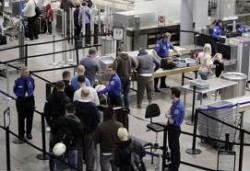Airport Security tightened post 9/11
by jparker • September 12, 2011 • News • 0 Comments
By JILLIAN PARKER
Airport security has vastly improved for the safety of this country prompted by the terrorist attacks on 9/11.
Post 9/11 attempts to bomb airlines prompted more changes. The Christmas Day bombing attempt in 2009 led a man tied with Al-Qaeda to strap explosives to his underwear. He entered the plane but failed to correctly detonate the bomb, leading to suspicion and his arrest.
Being patted down, checked with a metal detector, bulletproofing and locking cockpit doors, and taking off shoes and jackets, were some of the vast improvements that became in affect after 9/11, along with increasing the security teams. All security screenings are now run by TSA (Transportation Security Administration), instead of the airlines.
Restricted items, improved security on aircraft, improved security screening, full body screening, and identification checks were some of the repercussions taken in order to secure our safety.
Changes have been controversial. Civil liberties advocates argue such security procedures invade someone’s personal space. Passengers have never been shy to voice their opinions about the new security system, but with the 10th anniversary of 9/11 approaching, some wonder, did officials in fact make good security decisions or have they made matters worse.
The ACLU (American Civil Liberties Union) considers body searches only necessary if there is suspicion about drugs or if an individual is a threat. Many have proposed facial recognition technology by scanning the crowds standing in line at the airport, but there was a 43 percent inaccuracy.
A passenger who isn’t a frequent flier casually spoke with a member of security in Newark Airport just before the 9/11 attacks, and in the past ten years then has now refused to fly altogether.
“A few weeks before the terrorist attacks I was flying home from Florida, and when I landed ended up speaking with a member of the security team,” said Marie Morelli of Phillipsburg, NJ. “He mentioned that the security there wasn’t all that great and that there is a lot more they should be doing. Then the night before 9/11 I had a dream about planes crashing and mayhem everywhere.”
However, someone who is a frequent flier had a completely different take on flying.
“I have no problem with the airport security,” said Rick Caulfield, a CBIZ employee from Edison, NJ. “I also have never had issues with them overstepping their boundaries, but I know people who have. If you’re not a frequent traveler then you may get confused or intimidated.”
Frequent flyers: “Can’t worry about what can happen”
Passengers become part of the solution. Flight 93 passengers received phone calls and text message after the towers were hit, and for those reasons they fought to regain control. The plane crashed, but miles from its destination leaving no survivors. The “See Something, Say Something” campaign in NY encourages passengers on subways and airports to report suspicious packages. This provides them immunity if they have reasonable suspicion to go on
“I don’t feel unsafe when I get on a plane. I don’t worry about what could possibly happen because you can’t,” said Caulfield. “I keep an eye on things more than I would have 11 years ago, but I am not concerned when I’m on a plane, speaking as someone who flies six or seven times a year on average.”
Improving security has put America in better care, but there is never a time where something is so good that there is no need for improvements.
“I think security has improved tremendously, but do I think there’s not a potential for error? Of course there is. Humans are responsible for the machines and they can make mistakes missing things, but they are not fool proof.”
